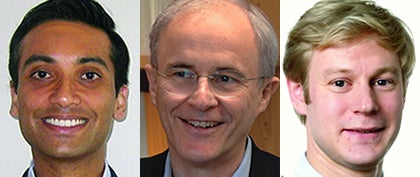Like many HLS students, Arvin Abraham ’09 took a job as an associate at a law firm after graduating. Yet, he did not leave his law school academic pursuits behind him. Thanks to a collaboration with a former professor, Lynn LoPucki LL.M. ’70, and a colleague, Bernd Delahaye LL.M. ’11, he is seeing the topic of his 3L paper expanded into a lengthy law review article to be published this fall.
Scheduled for publication in the Notre Dame Law Review, the article “Optimizing English and American Security Interests” is, according to Abraham, a first-of-its-kind comparison of the regimes for secured transactions in the United States and England. With more cross-border bankruptcies taking place, he explained that the topic is particularly relevant now.
“It’s a very volatile time for the economy, and companies are getting more multinational,” said Abraham. “We’re seeing more and more bankruptcies impact multiple jurisdictions. So I think it’s very valuable to have an understanding of these different systems.”
He was inspired to flesh out his 3L paper by LoPucki, who taught his Secured Transactions class at HLS and who also recommended Delahaye, another former student in the same class, to be a co-author.
As it turns out, both of the recent grads are associates at Sullivan & Cromwell: Abraham, whose background is in U.S. law but who also studied English law at University of Cambridge, in the London office, and Delahaye, who studied at Oxford and has a background in U.K. and European law, in the New York City office.
Their different experiences helped bolster the article, said LoPucki, a professor at UCLA School of Law who has been a frequent faculty visitor to HLS. While he understood the American system, he was looking for an entrée into the British system, he said.
“We each had access to different books, different research systems and different areas of expertise,” he said. “Yet we all had a common ‘systems’ perspective on security interests because both had taken my Secured Transactions course and read my casebook co-written with HLS Professor Elizabeth Warren. The project is one I could not have done alone.”
For Abraham, the greatest challenge was delving into a major academic project while practicing as a firm associate. At the same time, partners in the firm helped by reading the paper and offering comments. He would undertake such a project again in the future, he said.
“It’s a nice complement to working as a transactional attorney to be able to explore the law beyond the boundaries of just the deals you’re working on,” Abraham said.
